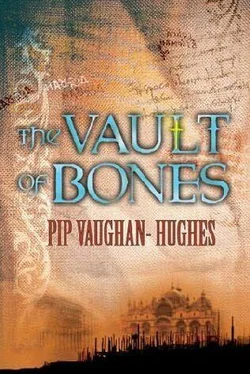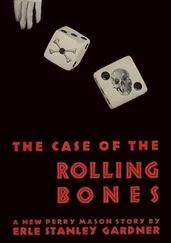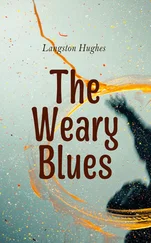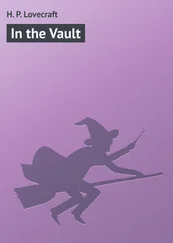Pip Vaughan-Hughes - The Vault of bones
Здесь есть возможность читать онлайн «Pip Vaughan-Hughes - The Vault of bones» весь текст электронной книги совершенно бесплатно (целиком полную версию без сокращений). В некоторых случаях можно слушать аудио, скачать через торрент в формате fb2 и присутствует краткое содержание. Жанр: Исторический детектив, на английском языке. Описание произведения, (предисловие) а так же отзывы посетителей доступны на портале библиотеки ЛибКат.
- Название:The Vault of bones
- Автор:
- Жанр:
- Год:неизвестен
- ISBN:нет данных
- Рейтинг книги:4 / 5. Голосов: 1
-
Избранное:Добавить в избранное
- Отзывы:
-
Ваша оценка:
- 80
- 1
- 2
- 3
- 4
- 5
The Vault of bones: краткое содержание, описание и аннотация
Предлагаем к чтению аннотацию, описание, краткое содержание или предисловие (зависит от того, что написал сам автор книги «The Vault of bones»). Если вы не нашли необходимую информацию о книге — напишите в комментариях, мы постараемся отыскать её.
The Vault of bones — читать онлайн бесплатно полную книгу (весь текст) целиком
Ниже представлен текст книги, разбитый по страницам. Система сохранения места последней прочитанной страницы, позволяет с удобством читать онлайн бесплатно книгу «The Vault of bones», без необходимости каждый раз заново искать на чём Вы остановились. Поставьте закладку, и сможете в любой момент перейти на страницу, на которой закончили чтение.
Интервал:
Закладка:
'And the boy?' I asked, fearing what the answer would be.
'Righi?' she said with something like a chuckle. ‘I know his mother. He is a good lad, but a fool. We will terrify him, then give him wine and a girl, and send him back to his master, where he will tell such tales of the fearful Englishman that Messer Nicholas, and all the quarter of San Polo, will wish to be your friend.' 'Is that so?' I said, bitterly.
'Perhaps,' she shrugged. 'Now. There is a stunned man upstairs. We will send him home today, with Facio and his two dead friends – the man on the stairs, his neck was snapped.' And she rose. I followed her out of the room, but she paused in the doorway, and raised the silver tip of her cane so that it hung in the air between us.
'Letitia is safe here,' she said. You do not know, O dealer in treasures, what a marvel you have brought back. Such a thing that not even the storerooms of the Palazzo Centranico have ever seen.' 'But how…' I began.
'And you may give my compliments to Messer de Montalhac,' she said. 'The quarter of San Polo is small, and full of secrets, but every secret, like a strand of spider-silk, ends here.' The cane tapped the floor between her feet. 'I tell you that as my gift of thanks. Now go.'
I had four things to my name in this world: the pope's letter and that of Brother Andrew, a purse of gold and silver, and my knife. A strange and powerful burden, to be sure, but now, I knew, quite useless save for the gold and, alas, the knife. I hid the letters inside my tunic and buckled on Thorn and purse. I wondered where Letice could be – or had Mother Zaneta meant me to go at once, with no leavetak-ing? Perhaps so, for one of the younger girls hurried over to me and held out a travelling cape with a large hood. She actually curtsied, and then tripped back to her companions, most of whom were lolling about as if nothing untoward had happened.
And indeed, there was little evidence to the contrary. As I pulled on the cloak I looked around the room. Everything was back in its place. The floor was wet but clean. Two new customers had come in, and were taking their ease, oblivious. Then I felt a touch upon my shoulder. Letice stood behind me. Her hair was plaited and coiled on top of her head, and she wore a simple shift of white cambric. I blinked, for she was suddenly very pure and fair.
'Go up to the north shore of Castello,' she said, 'and take a boat to the island called Cavana del Muran. The fishing fleet gather there in the morning and evening. Find someone to take you across to the mainland. It is too dangerous any other way.'
She took my face between her two hands and looked straight into my eyes. Her long fingers were digging into my temples and quivering minutely. The tip of her tongue brushed my upper lip. Then she was gone, a blur of white vanishing up the stairs. I stood there for a long moment, then I unlatched the door and went outside.
The square was busy again, and I shouldered my way, head down and hood up, through the teeming, flesh-tranced Venetians, feeling every eye upon me. Not looking back, I ducked into the Calle dei Morti, walked briskly past the entrance to the Calle Morto and found myself at the end of the street. I could turn left or right: on the right, the alley ended in a doorway. I turned left, following the alley until it turned again and deposited me in a narrow square. There was an ancient, Greek-looking church on one side and houses on the other. I heard the clack of shoes on stone ahead, turned a corner and stepped on to a busier thoroughfare. Slipping in amongst the people I slowed my pace.
I needed to get across the Grand Canal, but there was only one bridge, and as Letice had pointed out, it was the easiest place in the city to keep watch over. If I could find the canal, though, I could hire a boatman to take me across, or perhaps there were ferries. The Grand Canal was somewhere to my right, I knew, and I looked down each side street in the hope that I would find some clue as to how I might cross. But each passage or alley ended in a wall, and only the canals gave out on to the broader waterway, until at last my stream of people joined a larger stream crossing us from left to right, and looking that way I saw the water and a small crowd gathered on the embankment. It must be the ferry.
It was. A long, sharp craft was bobbing towards us over the canal, laden with figures all standing bolt upright despite the choppy water. It slid up against the dock and I marvelled at how the people all managed to get ashore without tipping the boat over. I edged forward with the crowd, hoping that I would be able to board as it seemed as if there were far too many of us for the slender ferry. But the two ferrymen, barking in dialect, guided every passenger to a precise spot, and at last I had handed over my coin and was stepping down on to what little deck remained free. The boat felt alive underfoot, twitching yet firm. My fellow passengers stood around me, stolid and uninterested, gossiping or silent. I felt as if I were naked and wet with smoking blood. The ferrymen heaved upon their long oars and turned us around. We slipped out into the open water of the canal.
The Grand Canal is wide – wider than the Tiber in Rome, yet narrower than the Thames in London – and crowded. Its shores are lined with palaces built of red brick and white marble, and churches great and small. To me it seemed as if a whole sea had been squeezed in between the buildings. The little black boats of Venice, the gondolas, were everywhere, darting about like water beetles. Bigger craft loaded with crates of fruit, live geese, piles of mortar, bricks and lumber ploughed up and down, and fishing boats, sails furled, were being rowed by weary fishermen. But I felt horribly exposed, and bit my lip nervously as our own boat sidled closer to the gaggle of striped mooring poles that marked the landing stage on the right bank.
Suddenly the ferryman in the prow cursed and began churning his oar furiously, hurling oaths to left and right. The ferry began to pitch alarmingly, and the passengers to stagger and mutter, and I looked about us to see, as I guessed, if we were about to be run down by a larger vessel. There was no big boat, but it seemed as if we had steered into the middle of a small fleet of gondolas. I counted seven of them, all fitted with odd little hutch-like structures that seemed to be made of half-barrels covered with black cloth. The gondoliers were wearing livery of red and white. The ferryman yelled to the nearest one in Venetian.
The gondoliers said nothing in return, but leaned carefully against their oars until, three on each side and one behind, they had closed in and were matching our pace exactly. I was beginning to doubt that this was an everyday occurrence on the canal when a flap opened in the side of the nearest cabin and I found myself looking at the polished head of an arrow.
What the..’ I gasped, and felt the other passengers go rigid beside me. The ferryman had shut up at last. Very slowly I looked around. Arrows pointed at us on three sides, and now I could see that within each cabin crouched a man, each armed with a small, curved Saracen bow. Their bowstrings were not taut, but I had seen such bows in the hands of Saracen mercenaries when we had put in to port at Messina. They had been shooting at butts, and at the time I had marvelled at the way they had seemed merely to pluck at the string to send their arrows deep into the target. Now it was very clear that, if the archers wished it, we would be dead in the blink of an eye. So I barely noticed that the seventh gondola, bigger than its fellows and rowed by two men, and with its own, larger cabin, had come across our bows.
What is this?' I hissed. I knew, though: but how had they found me so quickly? A man next to me understood my poor Roman speech and whispered back, 'The Doge's men. Someone hasn't paid their taxes.' He jerked his chin towards the ferryman in the prow, but then a black curtain hung across the end of the cabin on the big gondola, which a ringed hand pulled open. The owner of the hand bowed through the opening and stood up. He had the balance of a gondolier, for the boat kept quite still in the water. He was of medium height, very thin, and his austere black robe hung close about him. He might have been a priest, but he stood like a warrior. The lines of his face were deep and precise, and his eyes did not blink. They were eyes that would have been terrifying had they stared out from the slits of a helmet, but even so I found myself wishing I could simply roll out of our boat and sink into the muddy canal just to escape them and what they seemed to promise. He raised his hand and pointed straight at me.
Читать дальшеИнтервал:
Закладка:
Похожие книги на «The Vault of bones»
Представляем Вашему вниманию похожие книги на «The Vault of bones» списком для выбора. Мы отобрали схожую по названию и смыслу литературу в надежде предоставить читателям больше вариантов отыскать новые, интересные, ещё непрочитанные произведения.
Обсуждение, отзывы о книге «The Vault of bones» и просто собственные мнения читателей. Оставьте ваши комментарии, напишите, что Вы думаете о произведении, его смысле или главных героях. Укажите что конкретно понравилось, а что нет, и почему Вы так считаете.









